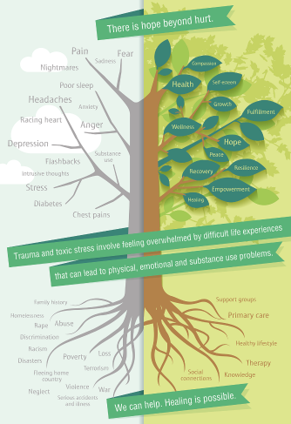What is Trauma Informed Care?

May is Trauma-Informed Care awareness month. Trauma-Informed Care initially focused on caring for war veterans in the 1970s who had experienced traumatic events. Researchers and medical professionals learned, through caring for these veterans, how trauma can have a lasting impact on the body and mind. In the 1980s, the National Institute of Mental Health coined the term “Post-Traumatic Stress Disorder,” or PTSD. This led President Ronald Reagan, in 1988, to recognize the need for trauma awareness and established May as Trauma Awareness Month.
As time passed, the understanding of trauma and its effects on the mind expanded outside of the war and into civilian life. Researchers wanted to know how individuals who experienced other traumas, such as abuse and neglect as children, compared to those who faced traumas well into adulthood.
In the 1990s, Dr. Robert Anda and Dr. Vincent Felitti conducted the Adverse Childhood Experiences Study. This study established that traumatic experiences can have a long-lasting impact on an individual from childhood into adulthood. Their work is essential to reducing the effects of adverse childhood experiences and building resilient communities.
Over the next few years, various organizations, including the International Society for Traumatic Stress and the National Center for Post-Traumatic Stress Disorder, were created. In the 1990s, the Substance Abuse and Mental Health Administration (SAMHSA) expanded the conversation of trauma and shed light on how abuse can affect individuals from an early age. SAMHSA also discussed how re-traumatization can occur years after the initial incident.
By 2000, SAMHSA and the U.S. Congress established the National Child Traumatic Stress Initiative and the National Child Stress Network.
Though the concept of Trauma-Informed Care has evolved over the last 50 years, it has gained increased traction and has become an institution for many. Still, there is much work to be done in raising awareness, becoming conscientious of others’ experiences and becoming more empathetic toward one another.
Trauma-Informed Care is one of the services are pleased to be able to offer our women and children at Transformation House.


